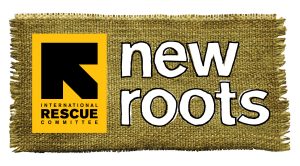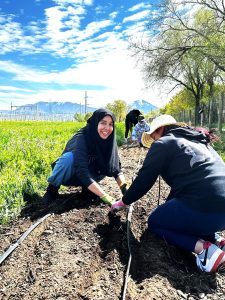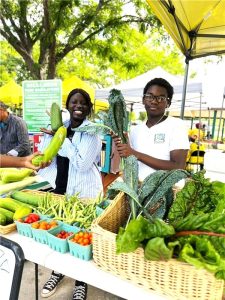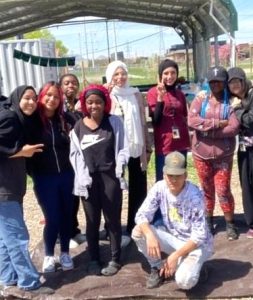
New Roots Youth Agriculture, Learning, and Leadership (YALL) Program
New Roots Youth Agriculture, Learning, and Leadership (YALL) Program, Salt Lake City, Utah supports refugee and new American high school students. The hands-on learning model promotes skills in agriculture, marketing, business, leadership, and communication, while preparing youth for future employment and building stronger connections to their community and local food system.
Vision
The New Roots Youth Agriculture, Learning, and Leadership (YALL) Program offers refugee and new American high school students the opportunity to develop practical skills, build confidence, and strengthen their connection to community. The program creates a safe and welcoming space where students can celebrate their heritage and build on the strengths they carry as children of immigrant parents—many of whom might otherwise struggle to access similar opportunities.
Running in the spring, summer, and fall, YALL brings together students from multiple schools and districts in a cohort-based model where the same group of students stays together through spring, summer, and fall programming, that emphasizes hands-on learning. Youth grow food at New Roots’ Redwood Farm, help lead the Redwood Farmers Market, participate in cooking classes, and engage in business and financial literacy workshops. Field trips, team-building activities, and opportunities to learn about livestock through the 4-H Refugee Goat Club further enrich their experience.
Alongside agricultural and leadership training, students gain valuable job skills, practice English in real-world settings, and form strong bonds with peers who share similar experiences. By combining education, community, and fun, YALL empowers young people to prepare for future education and careers while contributing to their local food system.

History
The Youth Agriculture, Learning, and Leadership (YALL) Program grew out of the International Rescue Committee’s long history of supporting refugees as they rebuild their lives in communities throughout the U.S. The IRC, a global humanitarian and refugee resettlement organization, started the New Roots program in Salt Lake City in 2009 to give refugees and new Americans a way to celebrate their heritages, grow food, and connect with their neighbors. Over time, New Roots expanded to include community gardens, farm business training, and farmers markets. In 2021, with support from United States Department of Agriculture’s National Institute of Food and Agriculture (USDA NIFA’s) Community Food Project Grant, the YALL program was born, as a way to serve youth participants. Since then, YALL has welcomed four cohorts of youth, bringing together 68 high school students from countries such as Afghanistan, Sudan, Burma, the Democratic Republic of the Congo, Somalia, Palestine, Burundi, Ukraine, and Syria. Through farming, food, and friendship, these youth are planting strong roots in their new community while building skills and confidence for the future.
To enroll students in the YALL program, outreach is conducted in January and February through adult New Roots community garden and farm business training program participants, IRC case managed clients, other local refugee and new American service providers, the local 4-H club, and outreach to schools especially students enrolled in the local Utah International Charter School and Roots Charter High, an agriculture focused high school.
Activities
Farming: Students gain hands-on experience growing food on YALL plots at Redwood Farm while learning the full cycle of agriculture. Training includes soil preparation, crop planning, and crop selection with an emphasis on culturally familiar varieties from students’ countries of origin, such as molokhia, roselle, African eggplant, Thai chilis, amaranth, Kermit eggplant, and bitter melon. Students learn planting techniques, weed and pest management, harvesting, washing, packing, storage, and food safety.
At times, students, work alongside adult refugee and new American farm business training program participants, encouraging inter-generational learning and communication.
Marketing: Youth gain real-world experience selling produce at the New Roots Farmers Market, held on Saturdays from June through October. They also operate their own Community Supported Agriculture (CSA) program, delivering fresh, seasonal produce from their collective plots directly to community members. Alongside building marketing and customer service skills, students take home extra harvests to share with their families.
Leadership Development: Youth take on leadership roles by helping facilitate and run the New Roots Farmers Market on Saturdays, gaining hands-on experience in marketing, customer service, and community engagement. They support refugee and new American farmers while helping the community access fresh produce through programs such as SNAP, Double Up Food Bucks, Senior Farmers Market Vouchers, and Local Food Purchase Agreement produce vouchers. Students also develop leadership skills by hosting and guiding groups of corporate volunteers at Redwood Farm and on their own plots, building confidence, teamwork, and practical management experience.
Cooking: Students take part in cooking classes and cooking activities where they learn to prepare culturally familiar healthy meals using farm-fresh ingredients. Classes highlight nutrition, food safety, and creativity in the kitchen.
Field Trips: Participants explore the wider world of food, farming, and community through field trips to local farms, outdoor spaces, and volunteer opportunities. These experiences expose students to new environments, strengthen teamwork, and connect them to the broader community.
Business & Financial Skills: Youth participate in interactive workshops taught by the IRC Economic Empowerment staff in order to develop financial literacy and learn the basics of business planning. In the financial skills workshop, youth gain practical skills in money management, including budgeting, saving, and understanding credit. They also explore the basics of entrepreneurship – how to generate business ideas, set goals, and understand costs and pricing. The sessions are designed to give them tools for both everyday financial decisions and an introduction to what it takes to launch and sustain a small business.
One example of hands-on learning takes place at the markets is at the New Roots benefits booth, where students run SNAP (food stamp) cards for customers, and provide a free dollar for dollar match to those customers with SNAP benefits. They also support the New Roots staff members with distributing Senior Farmers Market Nutrition Program booklets to low-income seniors and facilitating the food pantry at the farmers market. Through these experiences, they become more aware of the benefits available in their local community to support families and individuals in need and interact with people from different backgrounds and languages.
Team Building & Communication: Cohort activities include games and exercises designed to strengthen teamwork, leadership, and communication skills. These activities help students build trust, develop friendships, and grow as leaders.
Job Skills: Students strengthen essential workplace skills such as attendance, punctuality, communication, teamwork, and public speaking. Because English is the common language of the cohort, participants also practice and improve their English skills in a supportive, real-world setting.
Social Emotional Skills: Through games and interactive lessons, students build essential social and emotional skills, including: effective communication, conflict resolution, empathy, and self-awareness. These activities help youth develop stronger relationships with peers and navigate challenges both in and out of the program.
Livestock Experience: Through a partnership with Roots Charter High School and the 4-H Refugee Goat Club, students gain hands-on experience caring for livestock. This opportunity introduces youth to animal husbandry and provides a unique extension of their agricultural learning.
Community & Fun: Beyond skill-building, YALL works to create a welcoming, supportive space where students can relax, enjoy themselves, and build friendships with peers who share similar experiences.
Earn Income: Students who complete the full yearly program receive a $450 stipend, with an additional $50 bonus for excellent attendance. Stipends are reduced for absences beyond the program’s allowance, and students who leave the program early receive a prorated amount. This structure rewards commitment, responsibility, and consistent participation.
These lessons and activities prepare students for future education and career opportunities.

Audience/s served
- Student: Refugee and new American high school aged youth
- Peer Leader Position: YALL provides opportunities for high school graduates and college-aged refugee and new American young adults to serve as peer leaders. In this role, they assist staff in leading the program, mentor younger participants, and develop leadership and professional skills. Peer leaders also earn an increased stipend for their time, gaining valuable experience that supports their future education and career pathways.
- Parents: The NR staff members hold a parent night each spring post enrollment and prior to the program’s start for any parent of a youth planning to engage in the program that year to learn more about the program and the expectations for the students. Additionally, some parents aid in transportation of their children to programming.
- Community: The youth work with the local community through leading volunteer groups and volunteering at local organizations. Through these interactions, the community learns about the YALL program and the youth get to learn about their local community more. The youth also engage with other refugee and new American community members through supporting the New Roots farmers markets and distributing out public produce benefits.
Successful impact
The YALL program has had a meaningful impact on the youth it serves, as well as the wider community. Students consistently provide very positive feedback: highlighting the opportunities and experience to learn new skills, spend time with peers, work outdoors, and build lasting friendships. Over the first three years, each cohort enrolled 15–20 youth, with 8–12 completing the program. In year 4, 23 students enrolled and all completed the program, demonstrating growing interest and commitment.
Since the program began, students have grown over 10,000 pounds of fresh produce, which supports both their learning and the local community. Students have also earned a total of $20,032 in stipends, rewarding their hard work and dedication. Their support in running the New Roots Farmers Market has strengthened the local food system: pre-YALL market attendance averaged 1,775 customers, while in 2024, markets served 3,111 customers.
As one participant reflected: “These types of projects really opened my eyes to the needs in the community. Our group felt like family by the end of the summer. I was able to make friends that will last a long time.” – Joyce Elgadi, 2022 participant and 2023 Peer Leader.
Through YALL, students not only gain practical skills and leadership experience but also develop a sense of belonging, community, and empowerment that extends far beyond the classroom and farm plots.

Recommendations for replication and/or adaptation
- Engage Peer Leaders: Incorporating high school graduates or college-aged refugee and new American youth as peer leaders provides invaluable support to staff while giving students leadership experience and role models for younger participants.
- Run a Full-Cohort, Multi-Season Program: Youth thrive in a program that spans spring, summer, and fall. When the first cohort began in 2022, the plan was to rotate students each season, but all participants requested to continue. Multi-season engagement allows youth to develop deeper relationships, build confidence, and help shy participants come out of their shell.
- Financial Support: Paying stipends to students encourages enrollment and retention, particularly for students from low-income families. Stipends recognize the value of their time and effort while reducing barriers to participation as many youth are unable to participate in extra-curricular activities that don’t pay, due to the fact that they often need to contribute to household income.
- Balance Collective and Individual Learning: Assign students their own section of a small plot in addition to a collective teaching plot. This structure allows them to observe demonstrations on the collective plot and then practice independently, reinforcing skills and responsibility.
- Encourage Safe Transportation Independence: Whenever feasible, require students to transport themselves to the program site. This reduces staff burden and fosters independence. Provide bus passes if needed, along with an orientation to ensure students can safely navigate to the project site.
- If your program includes a farmers market, CSA, or similar sales avenue, consider integrating youth:
Integrate Produce Sales Opportunities: Dedicate certain sales avenues or CSA members to the youth program. Use the revenue to support stipends and program sustainability. Youth can earn income directly through sales, and proceeds can also help fund program supplies.
Scale Land and CSA Production: Ensure the farm plots are large enough to support a meaningful CSA or market production. For example, in 2024, YALL students fulfilled an 8-week CSA of 20 shares, which covered a substantial portion of their stipends while providing fresh produce to the community.
Structure Programming Strategically: Consider a schedule that includes soil preparation and planting in spring (April–May), intensive engagement in summer when school is out, and final harvesting and plot winterization in the fall. This rhythm maximizes learning, harvest, and skill development and is needed for sustainable programming to support sales.
Contact info
Sierra Govett
385-405-5604
Sierra.govett@rescue.org/newroots.slc@rescue.org
Newrootsslc.org
